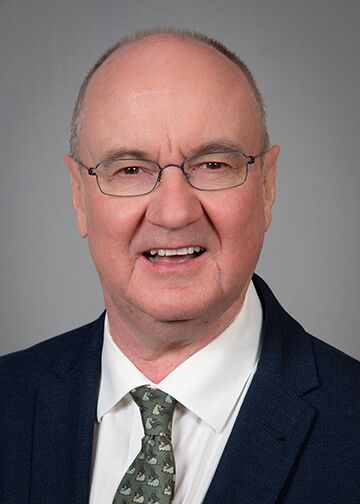The Feinstein Institutes—the research institutes of Northwell Health, New York’s largest health care provider—is home to 50 research labs, 3,000 clinical research studies and 5,000 people raising the standard of medical innovation. We make breakthroughs in molecular medicine, genetics, cancer, brain research, mental health, autoimmunity and bioelectronic medicine.
Douglas F. Nixon, MD, PhD
About the investigator
Douglas F. Nixon, MD, PhD, was born in Cambridge, England, and began his career at University College London, where he earned a bachelor’s degree in immunology with first class honors. He received his medical degree from the University of London. He then attended the University of Oxford, where he earned his master's degree and doctorate in immunology.
Dr. Nixon left Oxford to work at a biotech company on Long Island, New York, where he was appointed director of immunotherapy. He helped to develop a luteinizing hormone-releasing hormone (LHRH) vaccine for animal health, and lipopeptide immunotherapeutics for prostate cancer.
Dr. Nixon then joined the Aaron Diamond AIDS Research Center at Rockefeller University in New York City. During his time there, he earned the Elizabeth Glaser Scientist Award for investigating how antiviral white blood cells function in pediatric HIV infection, why they malfunction, and how these antiviral responses may be boosted. In 2002, Dr. Nixon joined the Gladstone Institute of Virology and Immunology in San Francisco. In 2006, he became a professor of medicine at the University of California, San Francisco, and associate chief of the division of experimental medicine. From 2013 to 2018, he was recruited to George Washington University as chair and Walter G. Ross Professor of the department of microbiology, immunology and tropical medicine.
Dr. Nixon was appointed as professor of immunology in medicine and The Herbert J. and Ann L. Siegel Distinguished Professor of Medicine at Weill Cornell Medical College in New York City in 2018. He then joined the Feinstein Institutes for Medical Research in 2024 as The Karches Family Professor in translational research and professor and director at the Institute of Translational Research.
Dr. Nixon is the past chair of the National Institutes of Health’s (NIH) AIDS vaccine research subcommittee, and principal investigator of the NIH’s Martin Delaney Collaboratories for HIV Cure Grant, “BELIEVE.” He has published more than 300 papers and has held multiple NIH grants, and has been continuously funded by the NIH for 25 years. He was awarded the Elizabeth Glaser Scientist Award, an NIH R37 merit award, and is a member of the American Society for Clinical Investigation, a fellow of the National Academy of Inventors, and a fellow of the American Academy of Microbiology.
Research focus
Dr. Nixon has actively pursued immunovirology research for more than 30 years. His studies span clinical research, human immunology, basic virology and molecular biology.
He is a pioneer in research on human endogenous retroviruses (HERVs), often referred to as part of our "junk DNA" or "dark genome," which impact neuroimmunological, neurodevelopmental and neurodegenerative conditions and aging. Dr. Nixon has published more than 300 articles in peer-reviewed journals, including Nature, Science, Cell, Proceedings of the National Academy of Sciences (PNAS), Journal of Clinical Investigation, and Public Library of Science (PLOS) Pathogens, and holds several patents. He has been recognized for several important contributions to HIV/AIDS research, and in 2024, his paper on psychiatric diseases was awarded the Gershon Paper of the Year by the International Society of Psychiatric Genetics.
Under his leadership, researchers at the Institute of Translational Research aim to accelerate scientific advancements into much-needed treatments for a wide range of diseases and conditions, such as Alzheimer's disease, Cancer, HIV/AIDS, other viral infections, and mental health disorders.
Lab information
Robert Furler O’Brien
Associate Professor
Email: [email protected]
Daniel Dunn
Program Manager
Email: [email protected]
Bruno Lima
Associate Program Manager
Email: [email protected]
Nicholas Dopkins
Instructor
Email: [email protected]
Sam Martinez-Meza
Research Scientist
Email: [email protected]
Solis Roldan Fryda Fernanda
Visiting Scholar
Email: [email protected]
Emily Scott
Director, Operations
Email: [email protected]
Jeffrey Malgady
Postdoctoral Research Trainee
Email: [email protected]
Helena Reyes-Gopar
Post Doctoral Research Trainee
Email: [email protected]
Nicholas Liotta
Consultant Bioinformatician
Email: [email protected]
Jez Marston
Collaborator
Email: [email protected]
Matthew Bendall
Collaborator
Email: [email protected]
Education
University College London
Degree: B.A.
Field of study: Immunology
Date: 1981
Imperial College London
Degree: MB/BS
Field of study: Medicine
Date: 1984
University of Oxford
Degree: MA
Field of study: Immunology
Date: 1991
University of Oxford
Degree: PhD
Field of study: Immunology
Date: 1992
Honors & awards
- 2024 Gershon Paper of the Year, International Society of Psychiatric Genetics
- 2019 Fellow, American Academy of Microbiology (ASM)
- 2014 Fellow, National Academy of Inventors (NAI)
- 2007-2018 R37 Merit Award, NIH
- 2012-2015 Chair, NIH Research Subcommittee
- 2000-2005 2000 Elizabeth Glaser Scientist
- 1989-1993 Special Fellowship, Merton College, University of Oxford
- 1989-1992 Junior Research Fellowship, Merton College, University of Oxford
- 1989 Young Investigators Travel Award, NIH
- 1989 Travel Award, Pfizer
- 1988 First Prize (Joint), Vaccine Research Trust, United Kingdom
- 1981 First Class Honors BSc, Immunology, University College London

